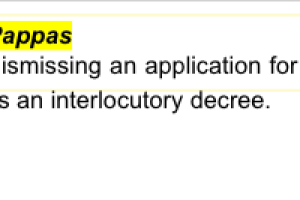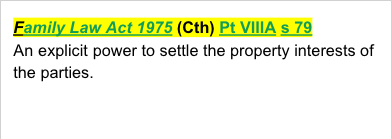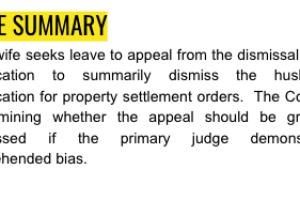- · 4752 friends
Wife Opposes Husband's Application for Property Settlement Orders

Duarte & Morse (No 2) [2022] FedCFamC1A 121 (4 August 2022)

The wife seeks leave to appeal from the dismissal of her application to summarily dismiss the husband’s application for property settlement orders. The Court, in determining whether the appeal should be granted, assessed if the primary judge demonstrated apprehended bias.

Facts:
The applicant wife and the first respondent husband were married in 2004. During the marriage, they had three children, all of whom now live with the husband. The husband and wife separated in 2013, and were divorced in 2015. In 2013 the wife commenced a relationship with the second respondent, with whom she has two children.
The proceedings between the husband and wife commenced in 2014. A central issue in the property settlement proceedings is the extent of the wife’s beneficial interest in a property at B Street, Suburb C (“the Suburb C property”) which was purchased by the wife and the second respondent. The wife appealed, and the Full Court dismissed the appeal with respect to the parenting orders, however, set aside the property settlement orders and remitted the property settlement proceedings for a new hearing. The second respondent contributed no funds towards the purchase (and the wife does not dispute that she is beneficially entitled to the share in the property registered in the name of the second respondent). The husband filed a Fifth Amended Initiating Application on 24 December 2019 (“Initiating Application”).
Various directions orders have been made, including an order for the parties to each make offers to settle the proceedings. The wife then sought orders to summarily dismiss the husband’s Initiating Application, which the primary judge refused. The wife did not file an application seeking leave to appeal, even though the issue was brought to her attention by the appeal registrar. Rather than dismissing the appeal as a result of this error by the wife, the Court permitted her to make an oral application for leave at the commencement of the appeal hearing, on the basis that she is unrepresented, it appeared to be a genuine error on her part, and there did not appear to be any prejudice to the husband.

Issue:
Whether or not the appeal should be granted.

Applicable law:
Family Law Act 1975 (Cth) Pt VIIIA s 79 - provides an explicit power to settle the property interests of the parties.



Analysis:
The primary judge did not find that the husband’s Initiating Application would require amendment to “enliven the s 79 discretion”, rather that, “the husband may need to give consideration to how such relief relates to a fresh exercise of the s 79 discretion”. It is apparent that the primary judge was alerting the husband to the need to consider whether an alternative form of property settlement order may need to be sought in the event that he was unsuccessful in obtaining orders for the wife to transfer the whole of her interest in the property to him.
There is nothing inappropriate about such a comment. That a person is unrepresented is a significant factor when a judge is determining whether to require strict compliance with procedural matters, so as to ensure that an unrepresented litigant is not denied access to justice as a result of technical defects whilst balancing the need to ensure procedural fairness to the other parties. It was entirely appropriate that the primary judge had regard to the fact that the husband was unrepresented.
As the delay in the proceedings was a factor relied upon by the wife in support of her claims that the proceedings were an abuse of process, it was not irrelevant to take into account that the wife’s unsuccessful summary judgment application had also contributed to the delay.
Conclusion:
The applicant’s oral application for leave to appeal is refused. Notice of Appeal No. NAA 63 of 2022 is dismissed.

















